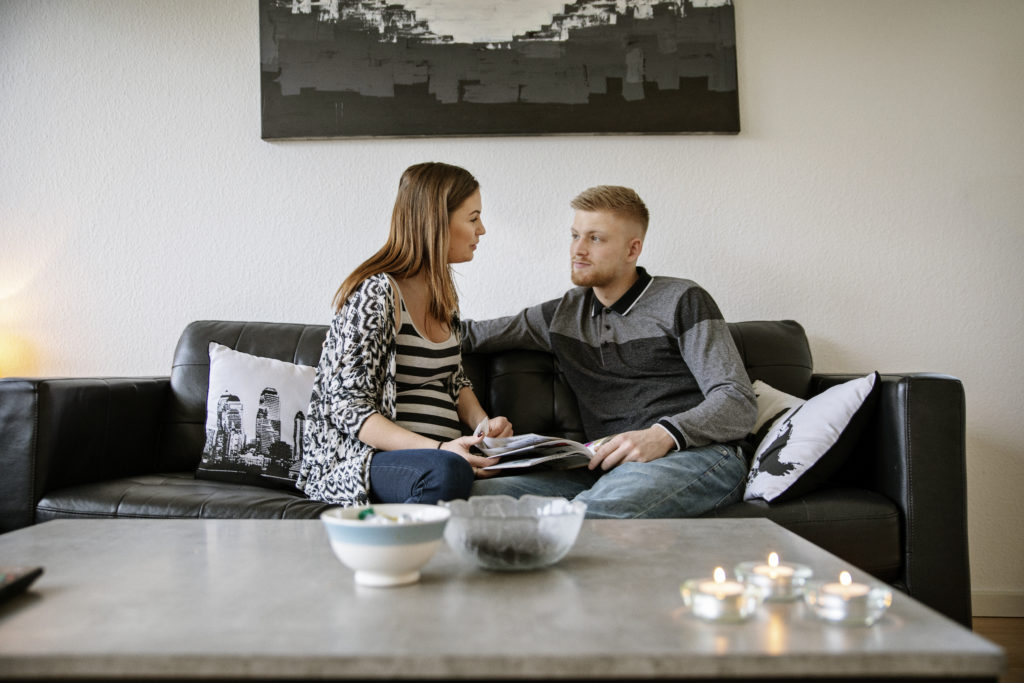Sådan forbereder du dig på fødslen og på at blive far
Det er en rigtig god idé, at du tager med din kæreste til fødselsforberedelse, så I sammen kan forberede jer på den store oplevelse, en fødsel er, og få svar på jeres spørgsmål om forløbet og fødslen.
Fødselsforberedelse kan være mange ting. I kan for eksempel gå til fødselsforberedelse hos en jordemoder eller på hospitalet, hvor I lærer masse om selve fødslen. Fødselsforberedelse er også at gå til graviditetskonsultationer hos lægen og jordemoderen eller at få graviditetsbesøg af sundhedsplejersken. Og så er fødselsforberedelse ikke mindst også jeres egen forberedelse på, hvordan I gerne vil have, fødselsforløbet skal være.
Det får du ud af at tage med til fødselsforberedelse
Selv om det er din kæreste og ikke dig, der er gravid, kan du få meget ud af at tage med til fødselsforberedelse. Du kan være med til at holde styr på alt det nye, få information om barnet og fødslen, og du kan være med til at tage vigtige beslutninger om graviditetsforløbet.
Langt de fleste fædre, der deltager i fødselsforberedelsen, siger bagefter, at det var godt, at de var med. Nogle gange skal du måske gøre en indsats for at blive inddraget, men det belønner sig som regel. Når du er med i fødselsforberedelsen, hjælper det dig med at forstå, at du snart er far, har et barn, og at meget i livet ændrer sig ret enormt.
#TIP
Som far kan du selvfølgelig også stille spørgsmål under fødselsforberedelsen og få svar på de ting, du gerne vil have styr på.
Det skal I overveje inden fødslen
En stor del af fødselsforberedelsen er at tænke over, hvordan du og I gerne vil have graviditeten og fødslen til at forløbe. Her er nogle forslag til, hvad du og din kæreste kan overveje.
Hos lægen, jordemoder og på hospitalet
- Vil du med til ultralydsscanninger, lægen, jordemoderen og fødselsforberedelsen?
- Hvad vil du spørge om de forskellige steder?
- Vil I gerne vide barnets køn?
Under fødslen
- Hvad skal du lave under fødslen (fotografere, modtage barnet, klippe navlestrengen osv.)?
- Hvad vil I gerne have, jordemoderen gør, og hvor meget skal hun være der?
- Hvordan håndterer du, at din kæreste får stærke smerter?
- Er der noget, du eller din kæreste frygter ved fødslen?
- Skal du helst blive sammen med din kæreste under hele fødslen, eller er det OK, at du går lidt, hvis du har behov for det?
- Skal der andre med til fødslen?
Efter fødslen
- Vil I gerne blive på hospitalet efter fødslen (hvis det er muligt)?
- Hvad er din rolle som far der?
- Hvis du ikke kan/vil være der, hvad kan du så lave derhjemme, mens din kæreste og dit barn stadig er på hospitalet?
- Vil I gerne være alene lige efter fødslen eller have besøg?
- Hvem skal I først ringe til efter fødslen?
Der kommer helt sikkert mange flere spørgsmål, og det kan være en god idé at skrive de spørgsmål ned, som I har, når I har snakket med lægen, jordemoderen eller sundhedsplejersken.




